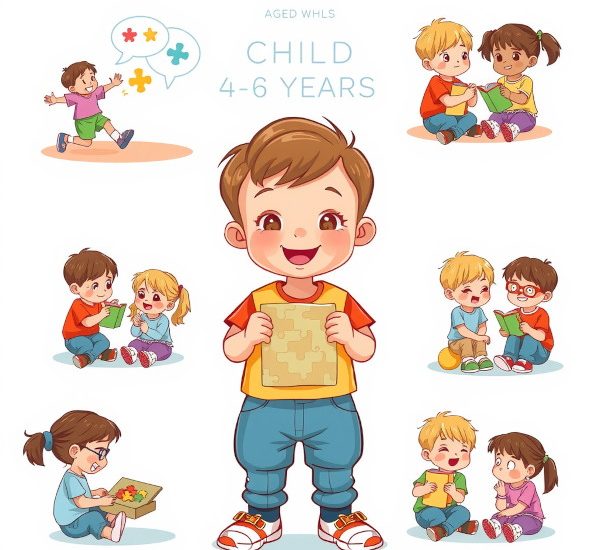As a mother of two children, I have come to understand that the job of a parent is full of challenges and difficult moments. There is no universal recipe for handling all situations that arise, but I have learned that there are certain approaches that can help reduce stress and improve the relationship with our children. This article is a continuation and complementary part of the article: Common parenting mistakes to avoid in early childhood and intends to provide a list of common parenting challenges and approaches.
1. Understanding my daughter’s needs and emotions
One of the biggest challenges for me has been to maintain my patience and understand my daughter’s needs and emotions, especially when she is tired or agitated. In such situations, it’s not always easy to stay calm and preserve my energy, but I have found that a positive and empathetic approach can sometimes make a major difference. An example would be when my child had a meltdown and started behaving aggressively. In that situation, I tried to stay calm and give my child space to express her emotions. I sat next to her and spoke to her in a warm tone, encouraging her to express her feelings in words rather than through aggressive behavior. After the meltdown had passed, we had a discussion with her about how to manage such emotions in the future.
2. Finding an appropriate balance of time.
Another challenging aspect was finding a balance between my personal time and the time spent with my child. It wasn’t always easy to set my priorities in a way that I could handle all the household chores and be present and available for my daughter. However, I managed to learn how to organize my time so that I can offer her the attention and support she needs, even on days when I’m very busy.
3. Learn from your child
Learning can be difficult for children depending on their personality and abilities, the quality and nature of educational resources available, as well as environmental factors and the context in which they spend their time. Parents can try to find innovative learning methods, such as learning through games, or involve their children in activities that stimulate them to learn. Also, parents can be involved in their children’s learning process, offering them help and support when they need it. When my child didn’t want to brush their teeth before bedtime and became very defensive when I told them to do so, instead of starting to shout or being very strict with them, I tried to explain the importance of dental hygiene and show them how to brush their teeth correctly in a fun and interactive way. We played games and sang songs about oral hygiene. In the end, this approach helped my child become more interested in dental hygiene and fulfill their responsibilities without too much struggle.
4. Managing your own emotions effectively
Often, parenting challenges can make us feel stressed, anxious, or even angry, but it’s important not to be overwhelmed by these emotions and to try to express them in a healthy and constructive way. I was put in a situation where I had to manage my own emotions when my child refused to listen to me. I felt very frustrated and started raising my voice at she, which only made the situation worse. After realizing that my behavior wasn’t helping to solve the problem, I took a break and tried to calm down. Then, I returned to my child and tried to understand why she was refusing to listen to me in a certain situation and find a solution together. I encouraged open communication and remained calm and empathetic in the face of my child’s frustrations and emotions.
5. Communication is key
I try to be open and empathetic in my conversations with my daughter, to listen to her and show her that I understand her. It is important to pay attention to how we communicate and to try to be as clear and concise as possible. My child was frustrated and upset because she couldn’t solve a difficult puzzle. Instead of telling her to try again or boosting her morale excessively, I encouraged her to express her emotions and talked to her about the importance of effort and perseverance. I emphasized that it is normal to face obstacles and fail sometimes, but it is important to focus on the progress we make and try to learn from our mistakes. I encouraged my child to try again, but without imposing it on her, letting her decide for herself when she feels ready to try again.
Although it can be difficult at times, it is crucial to set boundaries and respect our own needs. As parents, we are always concerned about our children’s needs, but we must remember that we also have needs and that it is important to take care of ourselves and relax in order to be the best version of ourselves in front of our children. Neglecting our own needs and excessive stress can lead to exhaustion and frustration, which can affect our relationship with our children and lead to unwanted behavior from us.
It is important to give ourselves time to relax and do things we enjoy, such as reading, sports, or socializing with friends and family. We can also try to delegate certain responsibilities or tasks to other family members to reduce our stress and focus more on our personal needs. It is important to remember that we are not perfect and that it is normal to need help or a break from time to time. By taking care of ourselves and respecting our own boundaries, we can be more present and patient in our relationship with our children, which can lead to better connection and a healthier and happier family environment.
We should not forget that we are humans and we make mistakes. It’s important to acknowledge that we are not perfect and we can learn from our mistakes. It’s important to forgive ourselves and move forward, trying to do our best to be the parents our children deserve.




